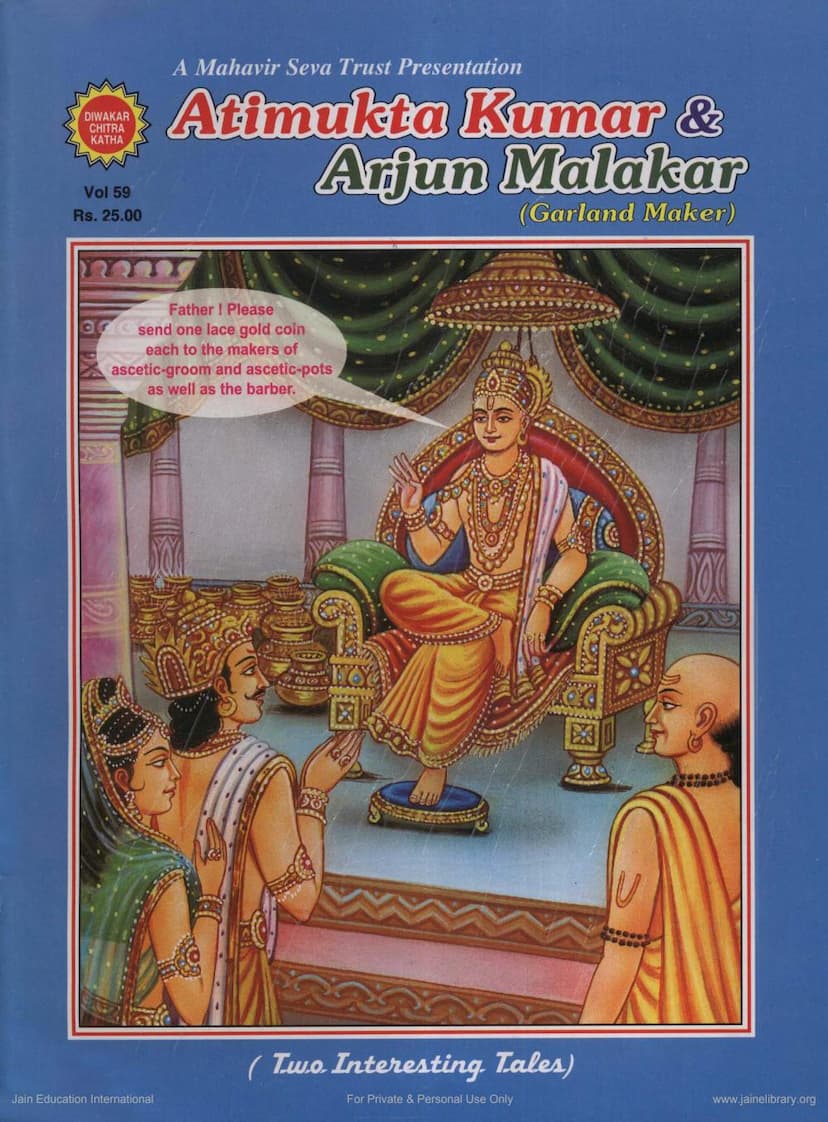Atimukta And Arjun Malakar Diwakar Chitrakatha 059
Added to library: September 1, 2025

Summary
Here's a comprehensive summary of the Jain text "Atimukta Kumar & Arjuna Malakar Diwakar Chitrakatha 059" in English:
This comic book, presented by Mahavir Seva Trust, features two inspiring Jain tales about individuals who attained liberation (Moksha) through their spiritual efforts. Bhagavan Mahavir's teaching that the soul is supreme is the central theme.
Part 1: Sage Atimukta
The first story is about Atimukta Kumar, the son of King Vijaya and Queen Shridevi of Polaspur. From a young age, Atimukta displayed a charming and innocent nature. One morning, he encountered Gautam Swami, the chief disciple of Bhagavan Mahavir, collecting alms. Intrigued, Atimukta invited the Swami to his palace, where his mother lovingly offered him food.
Atimukta, holding Gautam Swami's finger, accompanied him to meet Bhagavan Mahavir. He was deeply moved by Bhagavan's sermon on the fleeting nature of worldly pleasures and the path to eternal bliss. This inspired him to request initiation as an ascetic.
Despite his parents' initial reservations due to his young age and the hardships of ascetic life, Atimukta's resolve was unwavering. He eloquently explained his understanding of life and death, impressing his parents with his maturity. They eventually granted permission, allowing him to enjoy royal grandeur for one day before his renunciation.
The coronation day was a grand affair. After being crowned, Atimukta, as King, immediately requested a large sum of gold coins to be given to the barber for shaving his head and to the makers of ascetic equipment like the broom and bowls, signifying his commitment to renunciation.
The next morning, Atimukta embarked on his renunciation procession and was formally initiated by Bhagavan Mahavir. He immersed himself in studying the Jain scriptures.
During the monsoon season, while on a nature call with senior ascetics, Atimukta's playful childhood nature resurfaced. He playfully dammed a stream of rainwater and floated his ascetic bowl in it, singing with joy. The senior ascetics were angered by his transgression of ascetic discipline, particularly his use of "sachit water" (water with living organisms).
Atimukta, trembling with fear, immediately repented his actions and purified himself. Bhagavan Mahavir, aware of the situation, explained that Atimukta, though small in body, possessed a great and profound soul. He assured the senior ascetics that this was Atimukta's last birth before liberation and instructed them to care for him with respect.
After years of rigorous austerities, including the "Gunaratna Samvatsar" penance, Atimukta's body weakened. He ultimately attained perfect liberation on Vipul Giri hill through the ultimate penance of Sanlekhana (Santhara). The story emphasizes that purity and simplicity are key to attaining liberation, even for those with less scholarly attainment.
Part 2: Arjuna Malakar (Garland Maker)
The second story is about Arjuna Malakar, a humble garland maker from Rajagriha. He lived a simple life, selling flowers and offering the best to the Yaksha image in a nearby temple. One morning, while collecting flowers with his wife Bandhumati, they were ambushed by a group of six rowdy friends known as the Gaushtak Mandali. They tied up Arjuna, insulted his wife, and then Arjuna, heartbroken and faithless, blamed the Yaksha for not intervening.
In response to Arjuna's loss of faith, the Mudgarapani Yaksha (mace-bearing deity) possessed Arjuna's body. Empowered by the Yaksha, Arjuna broke free, killed the six attackers and his wife, and began a spree of violence, killing seven people daily on the outskirts of Rajagriha. This terrorized the city, and King Shrenik issued warnings.
During this time, a devout Jain merchant named Sudarshan decided to visit Bhagavan Mahavir, who had arrived near the city. Despite his parents' fears for his safety due to Arjuna's rampage outside the city, Sudarshan insisted on going, believing it a worthy cause to die for. His parents, recognizing his devotion, finally permitted him.
As Sudarshan approached the Yaksha temple, the Yaksha possessing Arjuna saw him. Sudarshan, undisturbed, stopped and prepared for his last moments, offering prayers and taking an ultimate vow (Sagari Santhara). The Yaksha, unable to strike Sudarshan with his mace due to his spiritual purity and focus on Bhagavan, experienced a burning sensation and fled Arjuna's body.
Arjuna awoke to find Sudarshan and, surprised, inquired how he had escaped. Sudarshan attributed his safety to the power of chanting Bhagavan Mahavir's name. He took Arjuna to Bhagavan Mahavir's sermon.
During the sermon, Bhagavan Mahavir spoke about the destructive nature of anger and the importance of forgiveness. Arjuna, deeply affected, expressed his desire to atone for his sins. Bhagavan guided him towards equanimity and austerities. Arjuna then accepted the five great vows and became an ascetic, embracing a life of forgiveness.
He took a vow to observe a two-day fast sequence throughout his life. While collecting alms in Rajagriha, people recognized him as the murderer of their loved ones and attacked him violently. Ascetic Arjuna endured this with equanimity, believing their revenge was a consequence of his past sins and might reduce his karmic burden. He returned without alms, accepting his fate with patience.
After six months of enduring such afflictions with equanimity and receiving minimal pure alms, Ascetic Arjuna observed a fifteen-day ultimate vow and attained liberation. The story highlights the transformative power of forgiveness, austerity, and the steadfast pursuit of spiritual goals, even in the face of extreme adversity.
The book also includes a brief tale titled "Vijay Thief" which is a separate narrative about a thief and a merchant, emphasizing the principle that ascetics consume food not for pleasure but to sustain their spiritual practice, much like the merchant Dhanna feeding the thief to fulfill a basic need.
Finally, the book promotes its series of colorful Jain storybooks as an entertaining and informative way to learn about Jainism.